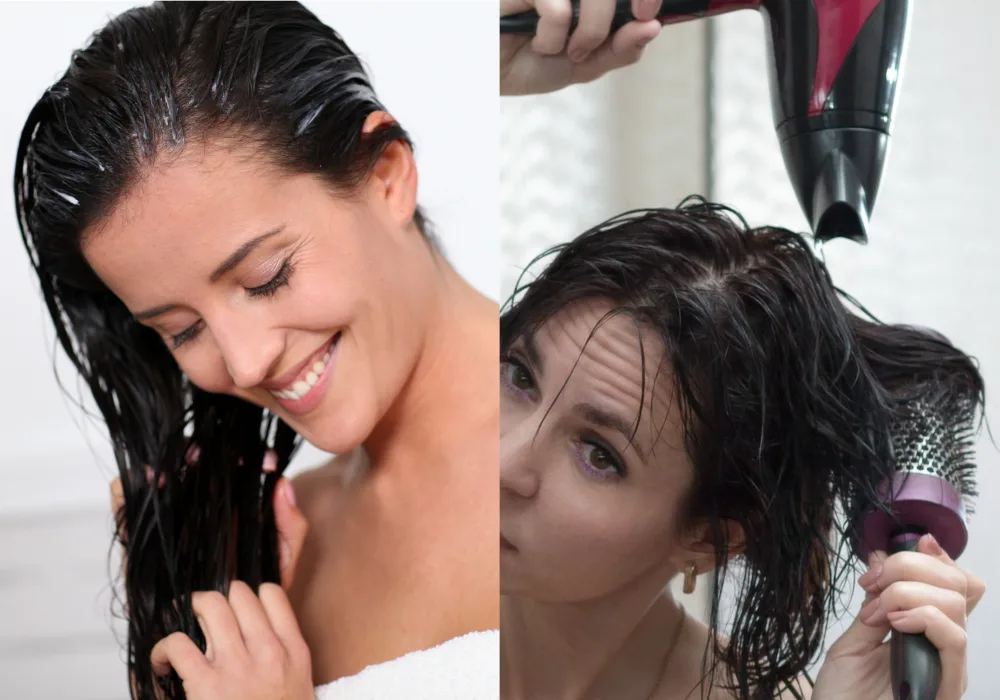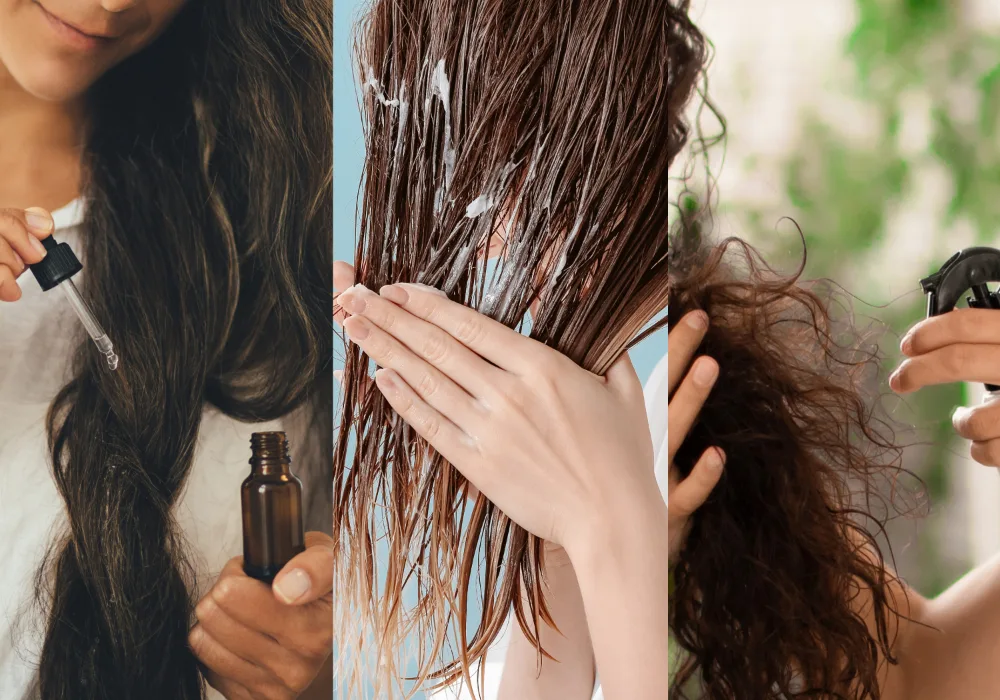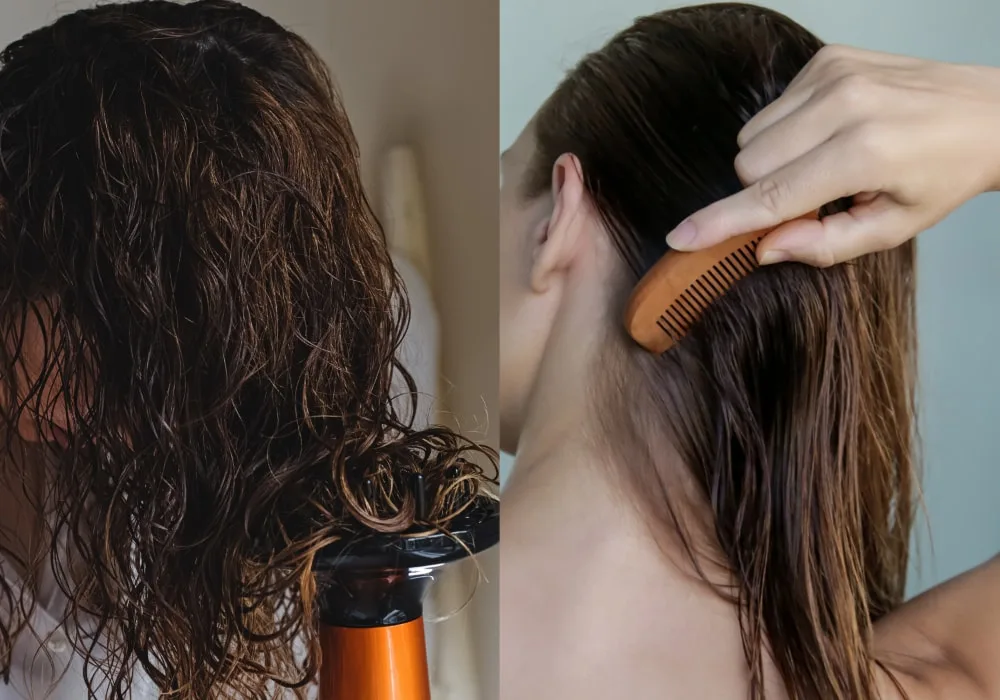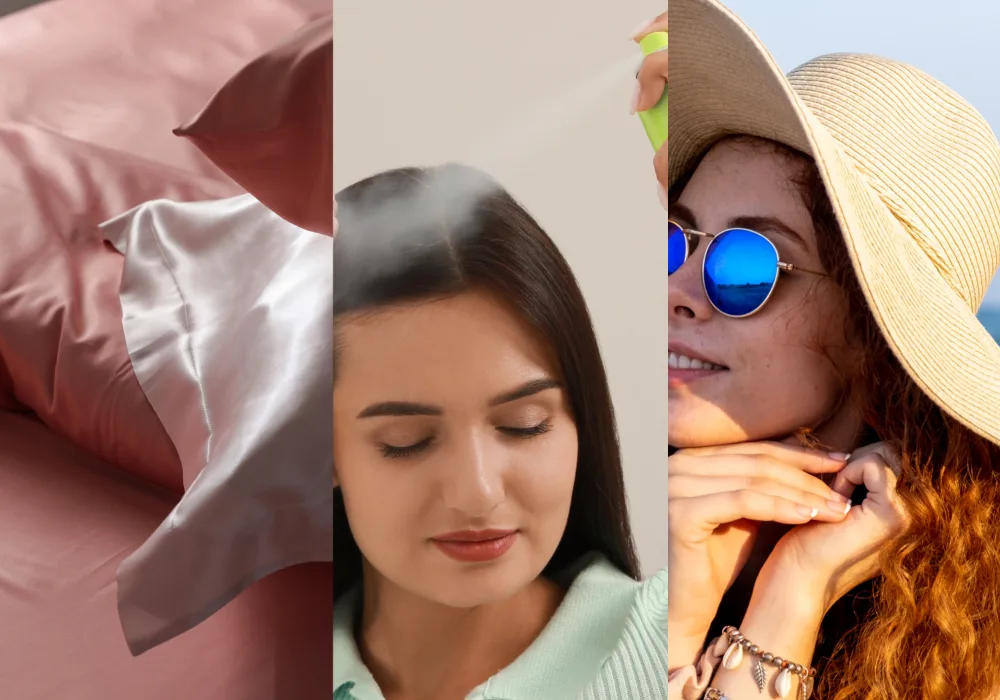Do you wash your hair like normal, let it air dry or roughly blow dry it and your hair becomes frizzy? No matter how much product you put in when styling it before washing, freshly cleaned hair becomes fluffy.
If you’re desperately looking for a solution to prevent it, we’ve got you covered. From the top tools to must-have hair care products, you’ll learn everything you need to know to stop your hair from going fluffy after washing it.
Why Does My Hair Get Fluffy After Washing It?

Hair becomes fluffy or frizzy after washing due to moisture absorption, raised cuticles, and loss of natural oils, which make the hair dry.
Your hair texture, washing, and drying methods determine how your hair reacts to moisture and can temporarily lift the hair cuticles. Damaged or dry hair becomes frizzy more easily as the cuticles (outer layer of the hair shaft) are raised.
If you are using hot water or shampoos with harsh detergents (like sulfates) to wash your hair, it can strip the hair of its natural oils. Without these oils, hair can become dry and fluffy.
Rubbing hair with a towel can disrupt the hair cuticle, causing it to become frizzy or fluffy. A gentler drying method, like patting with a microfiber towel or an old t-shirt, can help reduce this effect.
Skipping conditioner can leave hair less hydrated, making it more likely to puff up after washing. Conditioners and leave-in treatments help smooth the cuticles and keep hair manageable.
High porosity hair absorbs and loses moisture quickly, leading to frizz. This can be due to genetics (curly or wavy hair is naturally highly porous) or hair damage (like from coloring or heat styling).
How to Stop Hair Going Frizzy After Washing It?

To stop hair from becoming fluff after washing, start with a proper hair care routine that features lukewarm or cool showers and less shampooing.
Cool water helps close the hair cuticle, which prevents moisture from entering the hair shaft.
Try shampooing your hair once per week or twice if you can’t stand it. Be sure to use the right products and add in a good conditioner, but we’ll cover those in a minute.
Focus on massaging your scalp rather than scrubbing. Massage gently to remove buildup but not to strip away natural oils. Be sure to rinse thoroughly, so there’s no leftover shampoo.
Apply conditioner and let it sit in your hair for about two minutes before rinsing it out with cool water. The chillier temperatures close up those cuticles and provide protection.
Skip the towel-dry technique and opt for a gentler way to dry your hair after taking a shower. It’s best to use a microfiber towel, but you can also pull a clean t-shirt from your closet to absorb the excess water. Avoid blow-drying your hair as it can make your hair more fluffy.
Consider applying some heat protectant spray or cream before heat styling for an added layer of hair support.
Products to Get Rid of Fluffy Hair After Shower

Hair care products matter when you want to tame the fluff, and that means finding products with the right ingredients.
Hair Products
Choose shampoos and conditioners that are made for curly or textured hair and those that have moisturizing or nourishing agents.
Look for products with nourishing ingredients such as shea butter, coconut oil, and avocado oil. Avoid hair products with sulfates, alcohols, ethanol, or propanols because they can dry hair out.
Aside from choosing the right shampoo and conditioner, consider adding a few more products to your hair care routine.
- Apply a hair oil or serum to your hair after showering to help lock in moisture.
- Leave-in conditioners help moisturize and protect.
- Styling cream or mousse adds volume and texture to your hair while taming frizz.
- A light-hold hairspray helps keep your hair in place and provides additional protection.
Styling Tools and Hair Care

Your styling tools can contribute to the frizziness of your hair. Choosing the right styling tools makes managing fluffy hair easier.
A wide-tooth comb or pick is ideal for detangling your hair when it’s wet without damaging the strands. Ionic hair brushes help neutralize static and reduce frizz
If you blow-dry your hair, invest in a diffuser attachment that spreads the airstream for better, more even coverage.

On top of switching up your routine and choosing the right hair products and styling tools, you can adopt some other techniques to ease the frizz.
- Swap out your cotton pillowcase for a silk or satin one.
- Try using a dry shampoo in between washes.
- Add a weekly hair mask to your routine for some deep conditioning treatment.
- Wear a hat or use an umbrella when you’re out in the sun to protect your hair from heat.
So, achieving smooth, non-fluffy hair after washing requires a combination of good hair care practices, the right products, and tools.
Following these tips and making adjustments to your hair care routine will help you stop getting frizzy hair after washing.
FAQs
Do you still have questions about fluffy hair? We have answers. Below you’ll find the most common questions asked about fluffy hair.
Some shampoos and conditioners contain ingredients that can cause the hair to become fluffy, while others contain ingredients that can help to smooth and moisturize the hair.
Shampoos that contain sulfates strip the hair of its natural oils, leaving it dry and prone to frizz. Similarly, conditioners that contain heavy silicones or other ingredients that weigh down the hair can also contribute to fluffiness. You should avoid these products if you have fluffy hair.
Fluffy hair after washing can indicate that the hair is dry, damaged, or lacking in moisture. Overwashing and product buildup can also cause fluffy hair.
